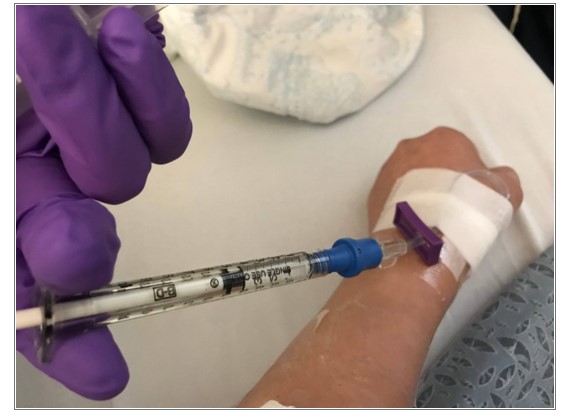A client has lorazepam prescribed before surgery and refuses the injection.
If the nurse administers the scheduled injection despite the client’s lack of consent, which term best describes the nurse’s action?
Malice.
Malpractice.
Negligence.
Assault and battery.
The Correct Answer is D
This is because assault is the threat of harm or unwanted contact, and battery is the actual physical contact without consent.
If the nurse administers the injection despite the client’s refusal, the nurse is violating the client’s autonomy and right to refuse treatment, and is committing both assault and battery.
Choice A is wrong because malice means having a deliberate intention to harm someone. The nurse may not have malice but may be acting out of ignorance or negligence.
Choice B is wrong because malpractice means a failure to meet a standard of care or conduct that causes injury or damage to a patient.
The nurse may be guilty of malpractice, but this is not the best term to describe the nurse’s action.
Choice C is wrong because negligence means a lack of care or skill that results in harm or injury.
The nurse may be negligent, but this is not the best term to describe the nurse’s action.
Nursing Test Bank
Naxlex Comprehensive Predictor Exams
Related Questions
Correct Answer is D
Explanation
A weak, rapid pulse indicates that the client is experiencing hypovolemia or low blood volume due to blood loss during surgery.
The nurse should recommend to the provider to administer intravenous fluids to restore the client’s circulating volume and improve their hemodynamic status.
Choice A is wrong because anticholinergics are drugs that block the action of acetylcholine, a neurotransmitter that stimulates the parasympathetic nervous system.
Anticholinergics can cause tachycardia, dry mouth, urinary retention, and blurred vision. They are not indicated for hypovolemia.
Choice B is wrong because urinary catheter placement is not a priority intervention for a client with hypovolemia.
Urinary catheterization can help monitor urine output and renal perfusion but does not address the underlying cause of low blood volume.

Choice C is wrong because beta blockers are drugs that block the action of epinephrine and norepinephrine, neurotransmitters that stimulate the sympathetic nervous system.
Beta-blockers can lower blood pressure, heart rate, and cardiac output.
They are not indicated for hypovolemia and can worsen the client’s condition.
To communicate this information using the SBAR tool, the nurse should follow these steps: Situation: Identify yourself, the client, and the problem.
For example: “I am (name), the nurse caring for (client name) in room (number).
I am calling because I am concerned that the client has developed hypovolemia after surgery.”
Background: Provide relevant and brief information related to the situation.
For example: “The client had a surgical procedure (name and type) at (time) today. They have lost (amount) of blood during and after surgery.
Their current vital signs are: blood pressure (value), pulse (value), respiratory rate (value), temperature (value), oxygen saturation (value).”
Assessment: Share your analysis and considerations of options. For
Correct Answer is B
Explanation
This is because offering fluids that the client likes and in small amounts can help increase the client’s fluid intake and prevent dehydration. According to, some other nursing measures that can help improve the client’s nutritional intake are:
- Encouraging favorite foods from home, when possible.
- Providing frequent oral hygiene.
- Providing a pleasant environment during mealtime.
- Providing assistance with eating, if needed.
Choice A is wrong because placing a freshwater pitcher on the bedside table may not be enough to motivate the client to drink more fluids, especially if the client does not like plain water or has difficulty reaching for the pitcher.
Choice C is wrong because explaining the problems of inadequate intake may not be effective in changing the client’s behavior, and may even cause anxiety or resentment.
Choice D is wrong because stressing the importance of drinking fluids may also be ineffective or counterproductive, as it may sound like nagging or lecturing to the client.
Whether you are a student looking to ace your exams or a practicing nurse seeking to enhance your expertise , our nursing education contents will empower you with the confidence and competence to make a difference in the lives of patients and become a respected leader in the healthcare field.
Visit Naxlex, invest in your future and unlock endless possibilities with our unparalleled nursing education contents today
Report Wrong Answer on the Current Question
Do you disagree with the answer? If yes, what is your expected answer? Explain.
Kindly be descriptive with the issue you are facing.
